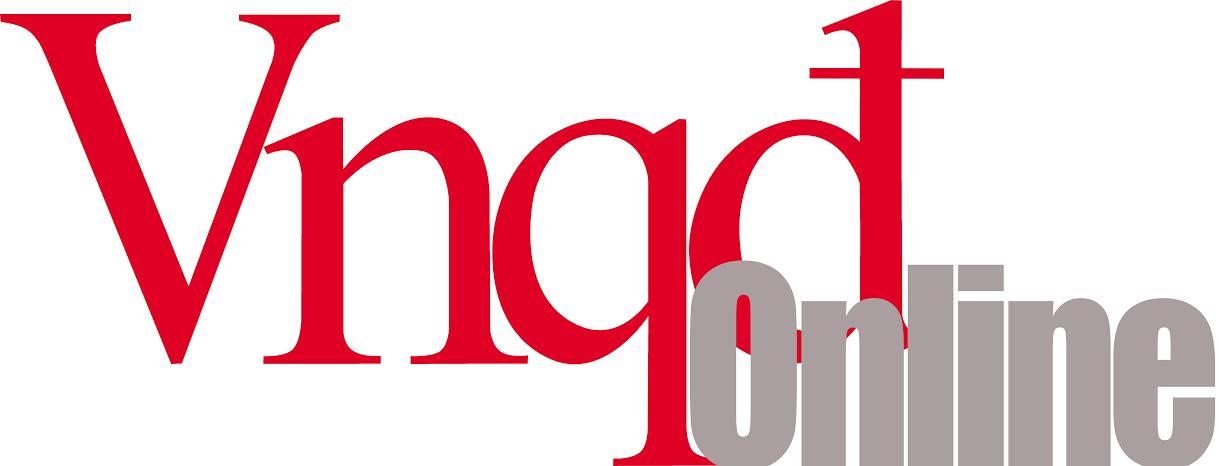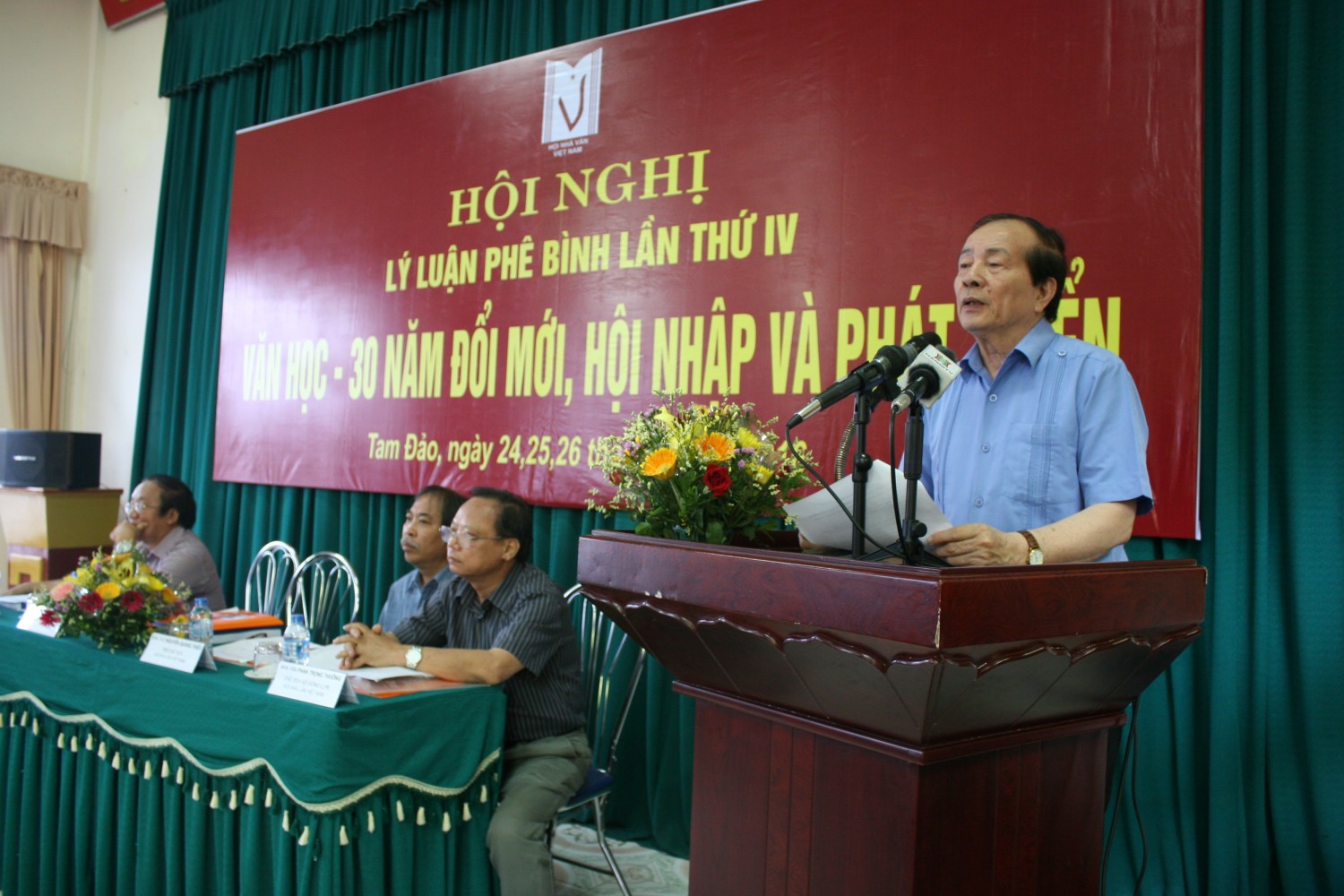 - The conference took place at Tam Dao - Vinh Phuc, on 24 and 25 June 2016.
- The conference took place at Tam Dao - Vinh Phuc, on 24 and 25 June 2016.
Mr. The Duc Bui - the Deputy Head of the Central Propaganda Board, Associate Professor, Dr. Dao Duy Quat - the Permanent Vice Chairman of the Central Literature and Arts Theoretical and Critical Council and delegates from relevant organs attended the conference.
The conference brought together nearly 200 writers, poets, theoretical critics, translators, with nearly 70 presentations. It was chaired by poet Huu Thinh - the Chairman of the Union of Vietnam Literature and Arts Associations, the Chairman of the Vietnam Writers' Association; poet Tran Dang Khoa, poet Nguyen Quang Thieu - the Vice Chairmans of the Vietnam Writers' Association and Prof. Dr. Phan Trong Thuong - the Chairman of the Theoretical and Critical Council, the Vietnam Writers' Association.
Delivering the opening remarks, poet Huu Thinh emphasized that, this year's conference theme itself - "Literature in 30 years of innovation, integration and development" - reflected its target of reviewing literature. But this is not a conference to review the entire literary life in 30 years, but a look at the appearance, tendencies, nature, characteristics and imprints of a literary process through the theoretical and critical perspectives. Therefore, it is important to have a comprehensive and integral overview and to assess truthfully to point out the achievements of literary innovation with its contribution to the cultural life of the country under the cultural study perspective. Conducting this job is not to do the math of adding achievements together, but rather to indicate new progress of a literary journey and to draw lessons for next years.

Poet Huu Thinh - the Chairman of the Union of Vietnam Literature and Arts Associations, the Chairman of the Vietnam Writers' Association (Photograph: HUU DO)
The conference keynote speech by Prof. Dr. Phan Trong Thuong stated: "We are facing the task of practical reviewing of the literature in 30 years of innovation in the capacity of insiders; both directly involved, directly created achievements and directly inherited the fruits of the innovation process'.
Looking back on the past innovating process, at every milestone of 10, 15, 20, 25 years, we conducted the review, assessing achievements and recognizing limitations and pointing out the reasons to continue innovating. Perhaps, at those times, the summation of literary practice was not paid due attention, in comparison with other fields. And this time, before the 30th year mark, we not only have more time, more achievements and experiences, but also have more scientific ground and objective conditions necessary to conduct a comprehensive review of literary practices.
With a scientific conference, we surely can not put out and solve all requirements. But at least, from the theoretical and critical aspect, we should try to clarify issues of academic and methodological significance to create the basis for the awareness, identification and evaluatation of literary practices for the last 30 years."
Compared to the past conferences, at this conference, its organizing committee had improved its agenda, allocating a whole section to the exchange of participants in every specific field including poetry, prose, theory and criticism and translations. The conference plenary session focused on the most general issues, especially pointing out the new requirements, new solutions in order to continue innovating comprehensively and synchronously the country's literature, bringing the literal life to a new hight, towards ethnicity, modernity, science and positive integration.
During the two days, the conference had suggested, discussed outstanding, pressing issues of the contemporary literary life such as literature with the fate of the nation and the people; the innovation, renovation inheritance and development of traditional heritage; generations of writers - continuity and distance; literature and market mechanisms; psychological change of literature receivers in the integration period; features of online literature and arts; the reception of Western theories in literary innovation; the change of the point of view of the function of literature; central characters of literature today; the relationship between creation and criticism; the expansion of women's writing; writers and creative freedom issues; poetry and innovative paths; literary translation and translating literature; the top and the floor of the novel; the penetration and interference of genres; literature and the issues of national reconciliation and harmony ...
Through serious and responsible discussion, from the practical perspective, the Conference came to the following conclusions:
- Although innovation is a complicated process, affected by many factors (the political ideological system, market mechanisms, the process of interaction and integration, theoretical systems, visual culture , internet technology ...), in the past 30 years, literature has took advantages of this historic opportunity to renew and refresh themselves on all aspects, of which thinking innovation, concept innovation, theoretical perception innovation can be seen as special achievements, which can bring about other achievements.
- However, besides achievements in the process of innovation and integration, literary life has revealed problems that must be recognized: signs of crisis in terms of value; lack of standards and standard deviation in creativity, enjoyment, receipt and evaluation; being fond of theoretical trends, formal creation chasing, market and trendy artistic taste chasing; departure from important issues of social life and the country history ...
- A number of useful lessons for the development of literature are: lessons about the capacity release of creative force; lessons on actively anticipating and handling well the impact of external factors, objective laws on the process of literature innovation and renovation ...
It can be said that the forth literature theoretical and critical conference has basically realized its set targets. However, a visible short-coming of the conference is the lack of young literary faces and voices.
HOANG DANG KHOA
(Translated by VU HUNG)